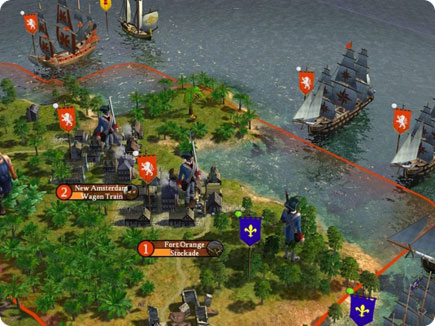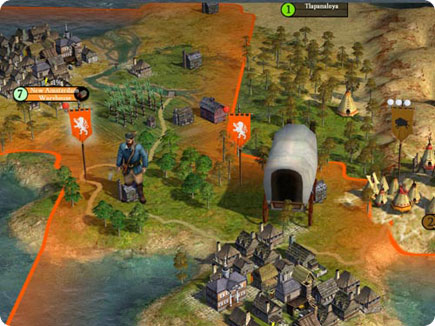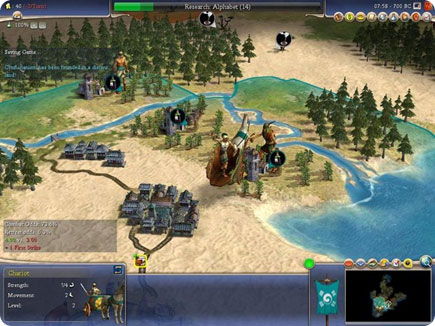- Site: Sid Meier’s Civilization IV: Colonization
- Publisher: Aspyr Media
- Developer: Firaxis
- Genre: Strategy
Civilization IV Not Required
You don’t need the full version of Civilization IV to play Colonization. This game is based on Civilization IV, but it is a standalone title.
By Brad Cook
A New World lies before you. Leaving Europe and settling there is a risky move fraught with danger, but it’s also an opportunity to earn freedom from an oppressive ruler and possibly build a brand new nation.

So you set out. You found a colony. It grows. You expand with new settlements. You trade goods with your European homeland, and you bring over more disgruntled people eager to begin anew. You establish an uneasy peace with the native population and negotiate tenuous relationships with other European colonies.
Your territory is small and easily manageable, so your ruler in Europe is pleased that you send goods and resources back to your homeland. When you prosper too, however, he grows irritated, and soon he begins asking for a piece of your newfound wealth, as a way to test your loyalty. Even if you acquiesce at first, he will ask more and more from you in the coming years.
Eventually you will have to ask yourself: Is the safety net of my European homeland worth the price I am paying? The New World offers plenty of resources, and your population and wealth will soon be able to grow without sending ships to Europe. Other colonies are also unhappy with their rulers, and they may move to throw off their shackles before you do — their freedom could threaten your prosperity. Make a wise decision; history depends on it.
Colonial Spirit
Civilization IV: Colonization begins in the year 1492, when Columbus sailed the ocean blue, and covers the next three centuries of strife and turmoil, as four European nations — Spain, England, France, and the Netherlands — explore North and South America and establish a foothold in the New World.
You guide colonists from one of those countries as they found new settlements, establish trading routes, gather resources and grow their population, manage relationships with native tribes and other colonies, develop their militaries, and eventually decide to throw off the yoke of European oppression. The winner is the first player to do so and defeat the forces sent by their King to squash the rebellion.
When you begin a new game, you choose between two governors, each of whom confers special bonuses. (See the chart below to learn more.) As the game progresses, you’ll have the opportunity to recruit founding fathers with even more potent bonuses, such as 50% faster travel time to and from Europe. (That comes in handy when you’re steadily angering your King and you want to make as many trades and import as many colonists as possible before he cuts you off.)
As in Civilization IV and its expansion packs, Beyond the Sword and Warlords, the relationships you establish with neighbors are key to your long-term success. Opening your borders to other European colonies will facilitate trade, but it will also allow them to possibly revolt before your citizens grow unhappy enough to do so, giving that player a chance to win. Angering them (or the native tribes), however, could pull you into a costly war and leave you without enough strength or allies to repel your King’s formidable forces.
When you declare your independence, you draft a constitution for your new country. The decisions you make during that process, such as whether you want free elections or a monarchy, will grant certain bonuses crucial to the end-game. What will you do in order to form a more perfect union?
Game Hardware
Check out our systems for your best gaming experience.

Beachfront Property. Make sure your first settlement is on the coast, so you can immediately start sending ships to Europe.

Move ‘Em Out! You can set up automatic trade routes to efficiently transport goods between cities.

Welcome to the Neighborhood. The local native tribe may not appreciate your intrusion on their land.
System Requirements:
- Mac OS X version 10.5.8 or 10.6.1
- 1.83GHz Intel Core 2 Duo processor (2.4GHz or higher recommended)
- 512MB of RAM
- 128MB video RAM (512MB recommended; ATI Radeon X1600 or Nvidia GeForce 8600 or better)
- 1GB hard disk space
- DVD drive
- Internet (TCP/IP) and LAN (TCP/IP) play supported. Internet play requires broadband connection.
If you liked this game, check out:
The Nations
Each country begins the game with a ship and two people.
| Nation | Bonus | Governor | Bonus |
|---|---|---|---|
| Netherlands | Mercantile: market prices are less sensitive |
|
+25% hammer production in all settlements |
|
+100% time between tax increases from the King, making him tax you more slowly | ||
| England | Tolerant: 25% fewer cross points needed before immigrants appear on European docks |
|
50% less equipment needed to arm soldiers |
|
+25% generation of Liberty Bells, which all colonies need to create a certain number of before declaring independence | ||
| France | Cooperative: native tribes more tolerant toward encroachment of their land, and new skills taught by native tribes take 50% less time to learn |
|
+100% conversion rate of natives to French colonists |
|
Free promotion of units to Grenadier I status, which gives them a 20% bonus when attacking settlements | ||
| Spain | Conquistador: 25% attack bonus against native tribes |
|
+100% boost from the effect of Liberty Bells on units’ attack abilities |
|
50% less experience points required to promote units |
Liberty Bell production leads to founding father points, enough of which eventually cause a founding father from one of five areas — trade, political, religious, exploration, and military — to offer his or her services. If you turn them down, they’ll make the offer to another nation and won’t return. Their bonuses tend to be powerful.
Examples of founding fathers include:
- Trade: Eli Whitney (+50% cotton production in all settlements) and Alexander Hamilton (three more hammers produced per town hall)
- Political: Ben Franklin (three more Liberty Bells for each printing press and newspaper) and Pocahontas (better relations with native tribes)
- Religious: John Harvard (a free schoolhouse in each settlement, allowing you to more easily convert colonists into skilled laborers) and Nathaniel Hawthorne (provides three elder statesmen who are experts in their fields and thus increase Liberty Bell production)
- Exploration: Juan Ponce de Leon (doubles your chances of finding treasure when you stumble across ancient ruins) and Vasco Nunez de Balboa (each settlements gets a 25% defense bonus)
- Military: John Paul Jones (provides one frigate) and Ethan Allen (improved furniture in all settlements — no, we’re kidding: he gives your gunpowder units free promotions to Ranger I and Mountaineer II)

